Key Takeaways:
- Early dysbiosis, or an unbalanced gut microbiome, can cause a myriad of gut health issues like lack of appetite, nausea and vomiting, and diarrhoea and runny poos.
- Dysbiosis can lead to inflammation of the gut wall, causing harmful bacterial to permeate the lining and wreak havoc in other areas of the body. This begins to impact things like skin and coat health, joints, heart, oral health, and brain function.
- Knowing whether these symptoms are connected to dysbiosis can be done so via a Gut Health Test for dogs. This is the first step in correcting microbial imbalance and ca help form the next steps. Whether that's diet changes or courses of supplements.
When it comes to taking care of their dog’s health, dog owners are now taking a more active role in ensuring their dog’s diet is not only filling them up, but also improving their health.
Here at Pooch & Mutt, lots of our subscribers include some form of supplement within their monthly delivery, whether that’s to help with their dog’s digestion, joints, or nerves and anxiety. But did you know, discovering what’s best for your dog’s diet and their individual needs means getting to know their gut health and microbiome?
The health of your dog’s gut microbiome can impact nearly every area inside and outside the body, and could even be the reason they just can’t seem to shift pesky, yet common symptoms.
For your dog to be gaining all the physiological benefits of a healthy gut microbiome, Pooch & Mutt’s Head of Microbiology, Dr Bushra Schuitemaker , tells us that it should be rich and balanced. In this article, we’ll be exploring what this means, and why it lends itself to bettering your dog’s overall health and wellbeing.
What is a microbiome?
A microbiome is a mini ecosystem of mostly bacteria that work to create and use chemical compounds such as acids and sugars. This then aids the function and strength of many processes around the body, including digestion, immune system function, gut health, skin and coat health, joint health, and brain function.
To explore more about the gut microbiome, its function, its role, where it came from, and why it’s so important, be sure to check out our article - Your Dog’s Gut Health: What is a microbiome?
What do we mean by a rich and balanced gut microbiome?
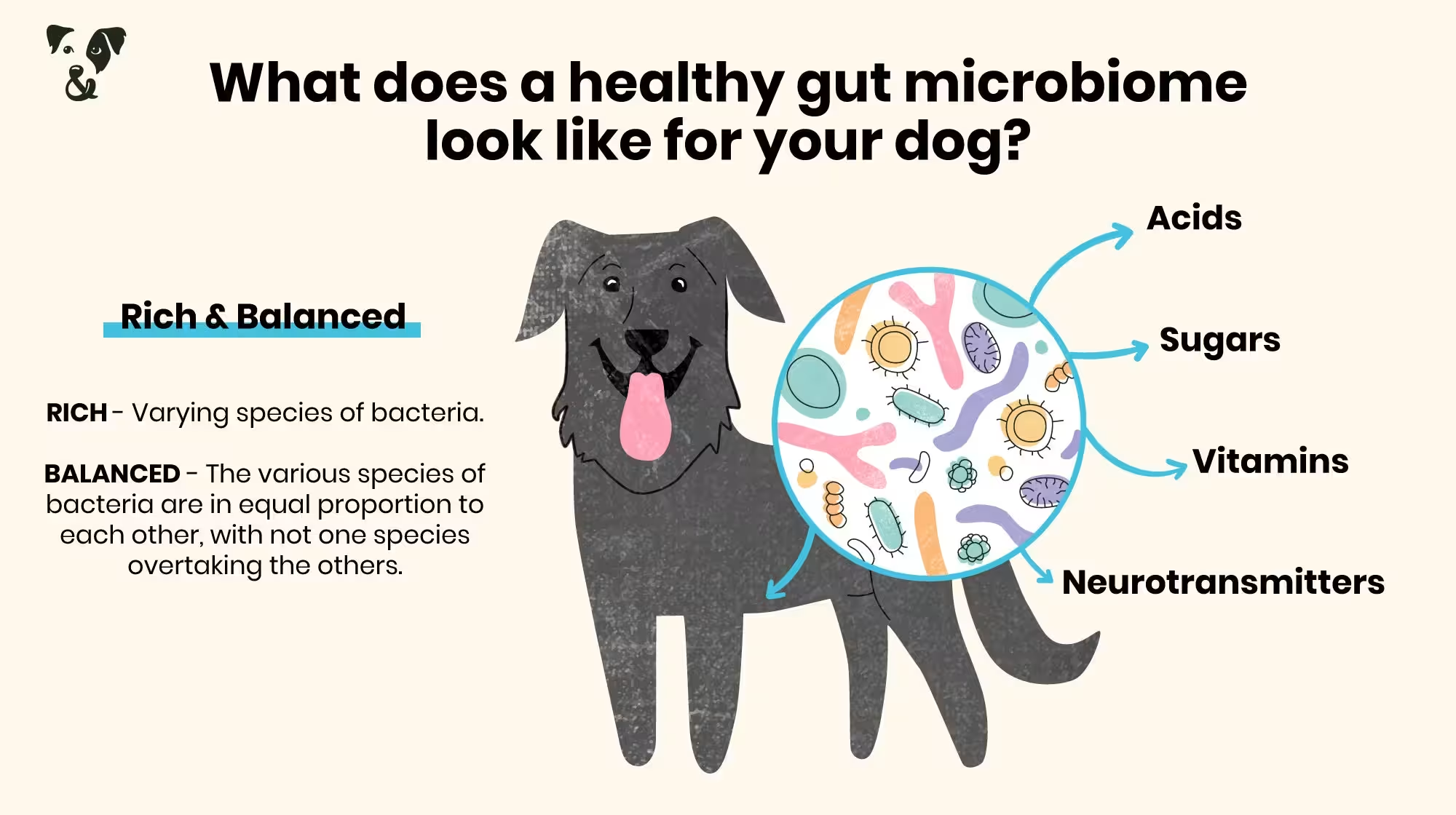
Our Head of Science and Research, Dr Bushra Schuitemaker , explains that a healthy dog’s gut microbiome is rich and balanced.
“This is referring to the gut microbiome’s microbiota - the ecosystem of bacteria that lives within it. For the microbiome to be working as it should, the diversity of bacteria within it should be rich, meaning varying in species and type, and balanced, which means in equal proportion. A gut microbiome that is causing your dog a little discomfort is often unbalanced, meaning certain bacteria are lacking or have become overgrown and out of control. When the microbiome becomes imbalanced due to unequal proportions of bacterial species, this is referred to as dysbiosis. Dysbiosis in dogs can occur for a long list of reasons, including some that lie within your control. From diet, lifestyle, breed, age and even their start in life - internal, external, and environmental factors can all knock your dog’s gut microbiome off balance. This makes both prevention and intervention key when it comes to perfecting your dog’s microbiome, gut health, and their health in general.”
How does dysbiosis impact your dog’s health?
Since the gut microbiome is so directly linked to your dog’s gut health, early dysbiosis can cause a myriad of gut health issues like lack of appetite, nausea and vomiting, and diarrhoea and runny poos. Without intervention, dysbiosis can lead to inflammation of the gut wall, causing harmful nasties to permeate the lining and wreak havoc in other areas of the body. This, in turn, begins to impact things like skin and coat health , joints , heart, oral health, and brain function .
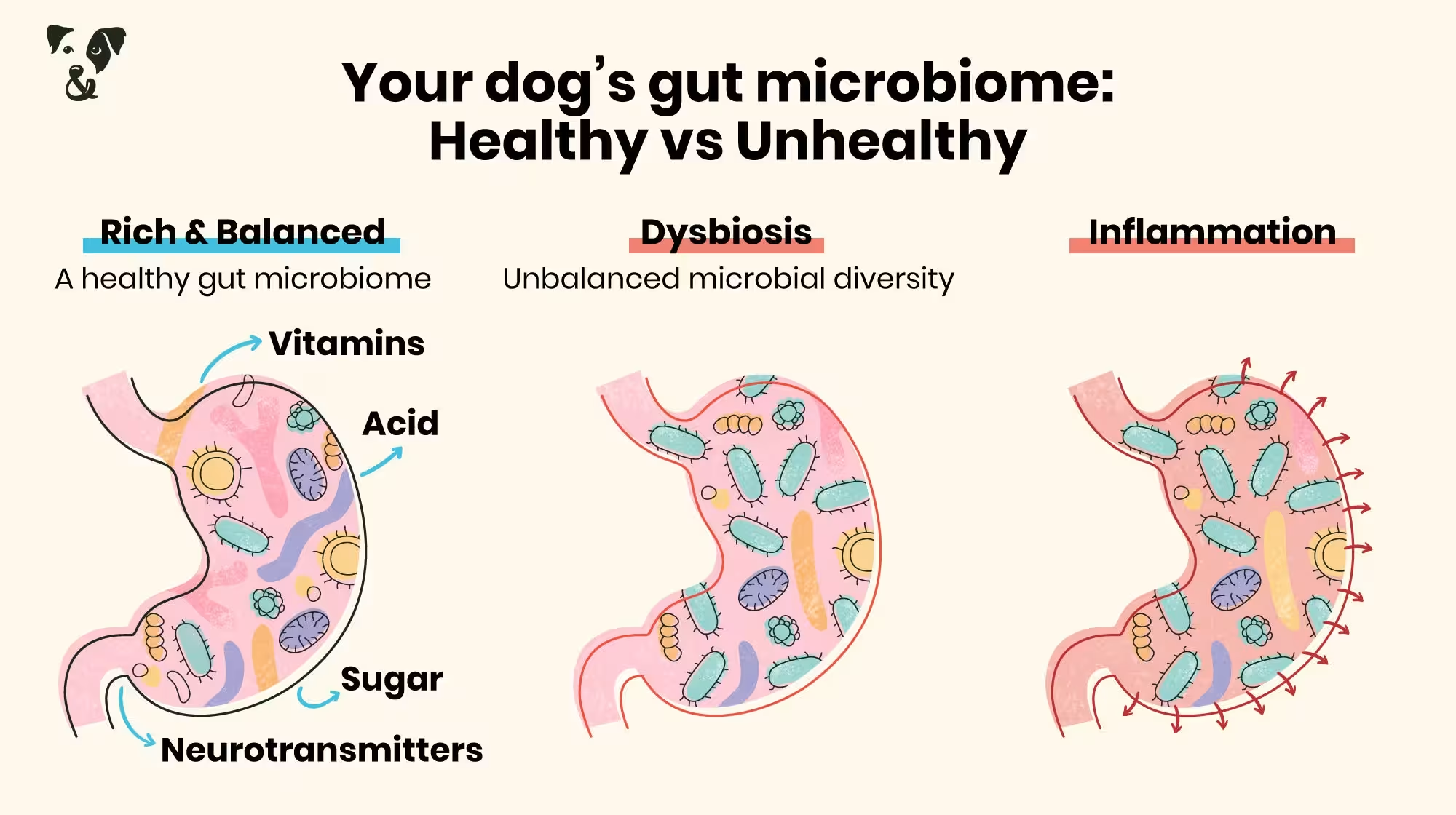
Signs that could indicate an unbalanced microbiome
An unbalanced microbiome, or dysbiosis, can lead to a long list of symptoms that can masquerade as common pooch ailments. Many dogs suffer with one or more of these symptoms throughout their life, often resulting in back-and-forth trips to the vet that seem to be to no avail.
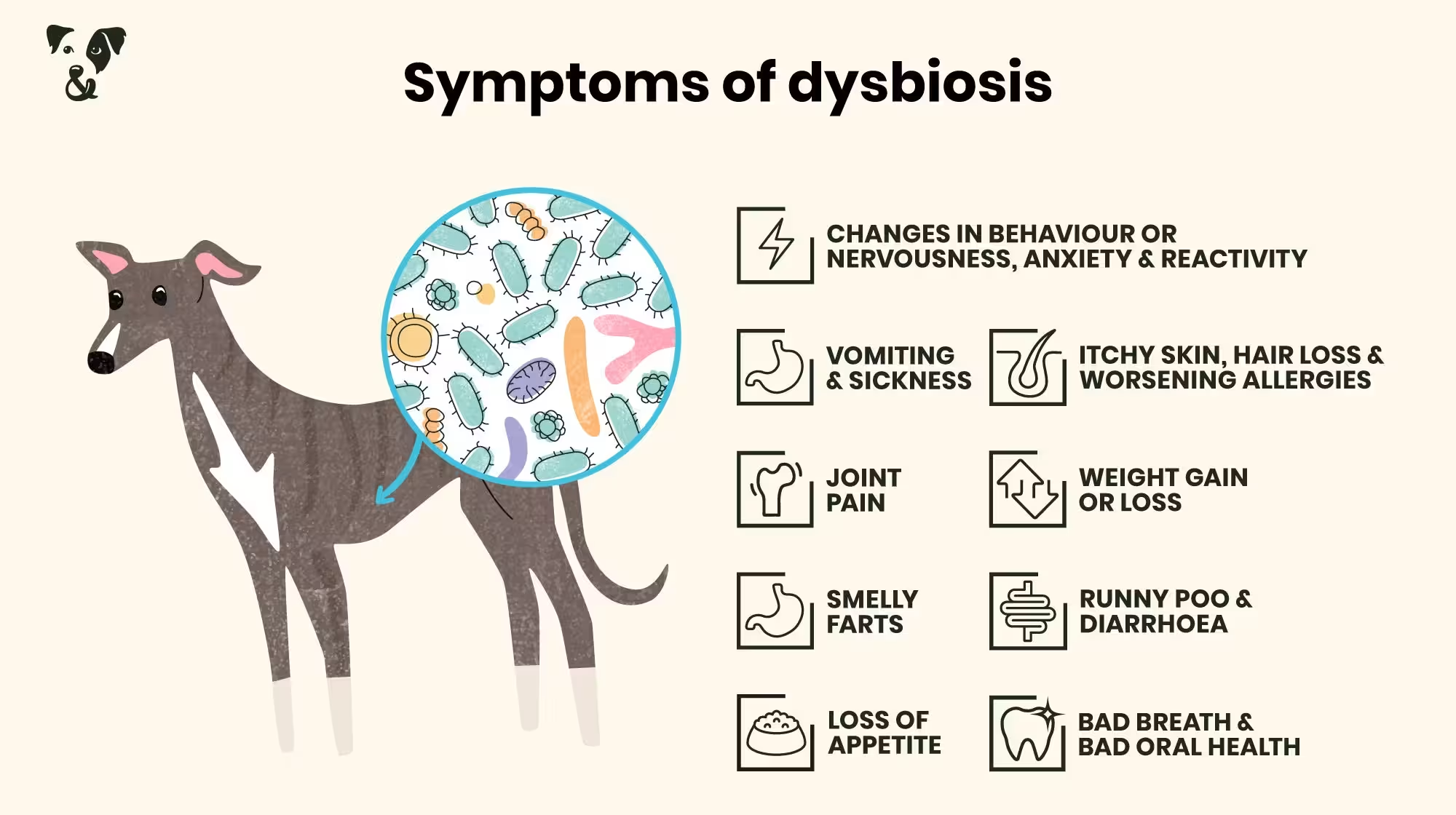
Diarrhoea and problems with poo
Since the gut microbiome is closely linked to digestive and gut health, an unbalanced microbiome, or dysbiosis, can cause diarrhoea and runny, problematic poos. The unbalanced ecosystem of bacteria can mean that your dog struggles to completely digest their food, meaning they miss out on absorbing beneficial nutrients and can suffer from a backed-up digestive tract. This can then lead to diarrhoea .
General bad gut health
The gut microbiome and gut health aren’t the same thing, but are directly linked. An unbalanced microbiome impacts their gut health due to its relation to digestion, their immune system, and the gut wall.
Many of the bacteria present within the gut microbiome contribute to immunological function, nutrient absorption, resilience, permeability, and the strength of the gut wall lining - everything that needs to be in tip-top shape in order to have great gut health.
Unresolved dysbiosis also leads to gut inflammation, which affects their overall gut health and other processes in the body. This can also exacerbate other symptoms of gastrointestinal diseases.
Smelly gas
Many of the genera found within the microbiome aid the fermentation of carbohydrates, fibre, and protein gained from your dog’s diet. With this and the gut microbiome being so connected to digestive and gut health, dysbiosis can disrupt these processes and cause foul-smelling flatulence .
 Gut Health
Gut Health
Loss of appetite
Is your dog a fussy eater ? The impact dysbiosis has on digestion and gut health can cause an upset stomach and, therefore, a lack of appetite. Disruption of the general digestive process prevents necessary nutrients from your dog’s diet being absorbed into the body, which consequently leads to symptoms such as this.
Skin irritation and hair loss
Late dysbiosis can easily lead to inflammation. As this affects your dog’s body, it can react through symptoms such as skin irritation and hair loss . With this, dysbiosis can also exacerbate allergy symptoms like constantly rubbing their face, licking, and chewing at their paws. If your dog’s coat seems to be lacklustre and thinning in some areas, dysbiosis may be to blame. Specifically, it has been found that dogs with dysbiosis-led skin irritation often have an overgrowth of Streptococcus.
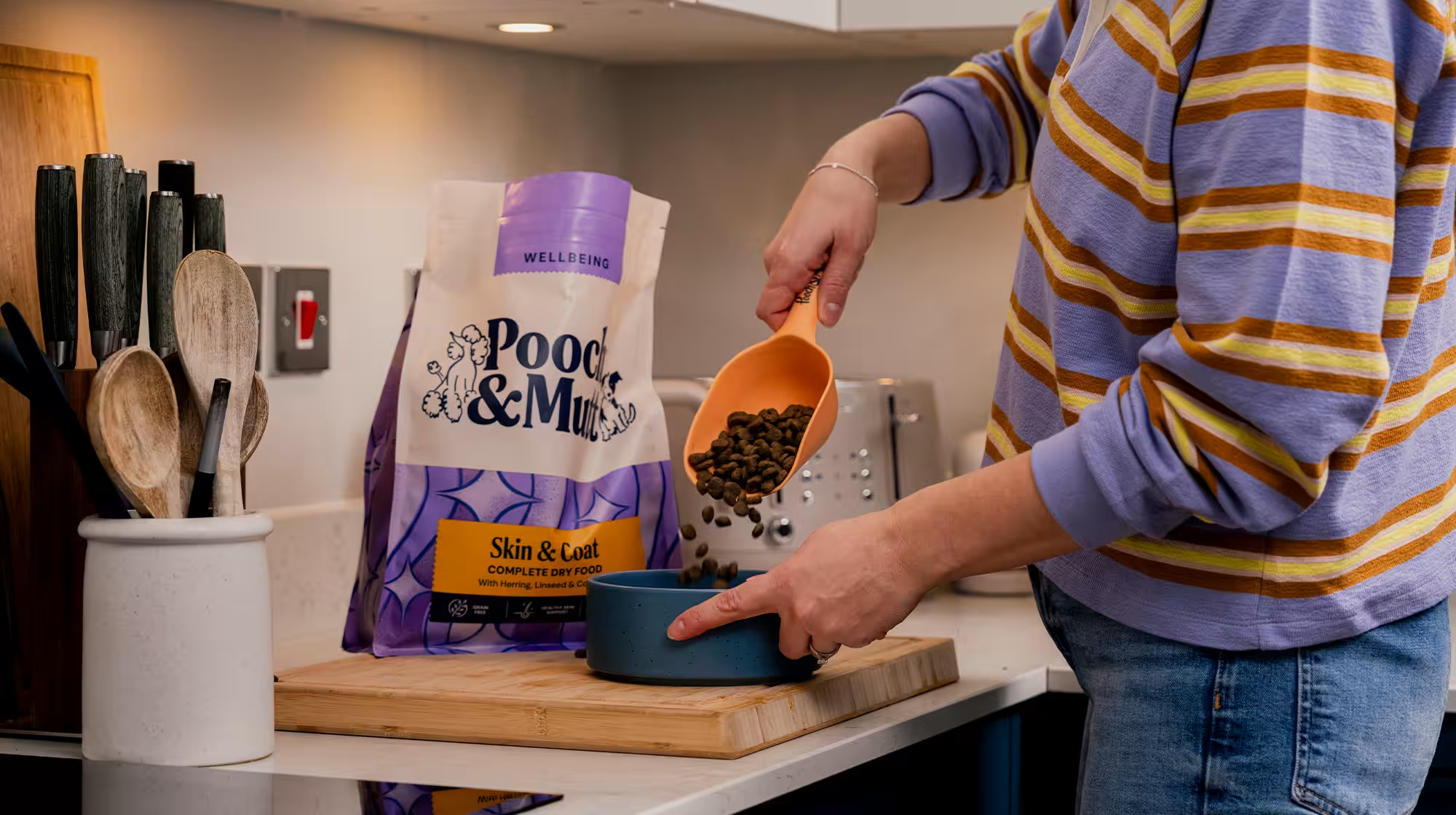
Bad breath and bad oral health
The imbalance of bacteria in their gut microbiome often leads to an overgrowth of more harmful bacteria, which can consequently cause bad breath in dogs . This is due to harmful bacteria producing unwanted gas, which can expel through your dog’s breath, making for a foul odour. Plus, the impact on the immune system also means your dog’s body can’t fight off harmful bacteria as it should, even in the mouth. This means issues such as teeth problems and periodontal disease can easily manifest.
Weight loss or weight gain
Genera like Faecalibacterium and Blautia exist in your dog’s gut microbiome and help with many bodily functions and processes, including weight management. The lack or overgrowth of bacteria like these can either contribute to weight loss or weight gain, and in severe cases, obesity.
Joint pain and mobility issues
Late and untreated dysbiosis leads to systemic inflammation starting in the gut and then impacting most parts of your dog’s body. This can then lead to inflammatory diseases which impact the muscles, tendons, and joints.
If there isn’t the right amount of bacteria in the microbiome to help immunological function and gut health - the gut wall doesn’t work as it should and allows excess chemicals and harmful compounds to work their way around the body. This also makes the already existing joint and mobility issues worse.
Changes in behaviour or nervousness, anxiety, and reactivity
Some of the bacteria in your dog’s gut microbiome help to produce and use neurotransmitters. These are ‘carrier pigeons’ within your dog’s body that help transmit signals to different nerve cells, telling your dog’s body how they’re feeling. Dopamine is a well-known neurotransmitter and is also responsible for feelings of happiness and pleasure in dogs. When things aren’t in place to get these feelings of happiness flowing through your dog, they can be left feeling quite the opposite. This highlights the recognition of the ‘ gut-brain axis ’, which is the direct link between your dog’s gut health, microbiome, and brain function. Many genus types that live in the microbiome contribute to brain health and function, and can impact behaviour.

As well as this, some other symptoms of dysbiosis, like gut issues, digestive issues, and joint problems that cause hidden pain and discomfort, can also cause dogs to display signs of increased nervousness, irritability, anxiety, and stress.
Whilst these symptoms aren’t always strictly connected to dysbiosis, they can be signs of underlying medical conditions. Investigating them via their microbiome health can be a great way to rule dysbiosis out and guide their diagnosis and treatment plan. To learn more about exactly what bacteria live in your dog’s microbiome (and their function), check out our article: ‘ Dog owners: What you need to know about your dog’s gut microbiome ’.
How do you know if your dog’s symptoms are caused by their microbiome?
The way to find out whether an unbalanced microbiome or dysbiosis is the route of your dog’s symptoms is by conducting a Gut Health Test .


Gut Health Test
Get your results in 4 weeks, with our quick and easy, at-home Gut Health Test for dogs. One simple poo sample, analysed by our microbiologists, and you’ll get personalised recommendations to help your dog thrive.
*This item is excluded from all discount codes.
-
Science backed gut health insights
-
Online report including key health indicators
-
81% saw an improvement in their dog's health
Current price: £69.99
Gut Health Test
This is where a sample of your dog’s poo is analysed in our lab to pull a representative look at the diversity of bacteria that live within their gut. This is collated alongside other impacting factors such as their breed, age, lifestyle and activity levels, and medical history.
This then gives a comprehensive insight into the health of their gut and its microbiome, and tells how we can approach their diet, supplement plan, and lifestyle, to get things back on track.
If everything’s looking healthy, then you can return to your vet to further investigate their symptoms.
How can you help your dog’s dysbiosis?
Whether you’re looking to prevent or treat dysbiosis, the best way to help your dog is through their diet. There are many factors out of your control when it comes to caring for your dog’s gut health and treating dysbiosis. But making sure your dog is on the best diet possible for their needs, with added goodness through prebiotics, probiotics, and edible supplements, is the best step towards strengthening and rebuilding their gut microbiome. And the best way to know exactly what your dog needs, is through a Gut Health Test .
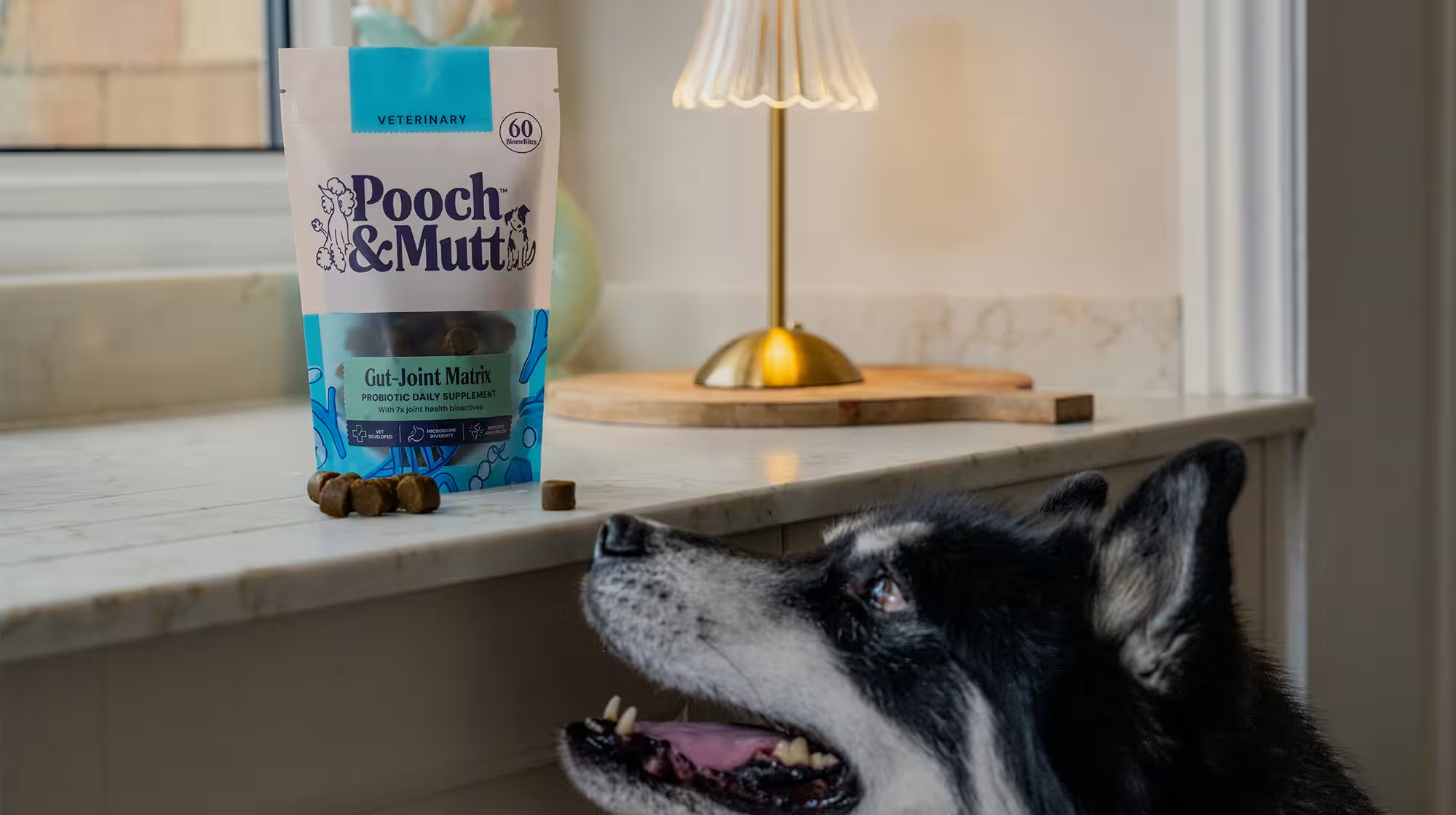
Summary
A healthy dog’s gut microbiome is rich and balanced. This means the bacterial ecosystem living in their microbiome is of varying species and in equal proportion to each other, allowing each role and function to perform as they should. This includes the production of crucial compounds like acids and sugars, as well as hormones and neurotransmitters that are necessary for the proper function of processes around the body.
When a dog’s microbiome is unbalanced, or in a state of dysbiosis, bacteria can’t function as they should, and like a domino effect, impact the other processes around the body - showcasing detrimental symptoms, including bad gut health.
Investigating your dog’s gut health and their microbiome is key to optimum health and wellbeing. Not only is prevention key, but maintenance is too - working on their diet to make sure it's truly serving their needs and elevating symptoms.
If you want to take the first step towards helping your dog, a Gut Health Test is the way to go.
Explore more about our Gut Health Test and supplement subscription at Pooch & Mutt, and in the meantime, don’t hesitate to contact our expert team.





